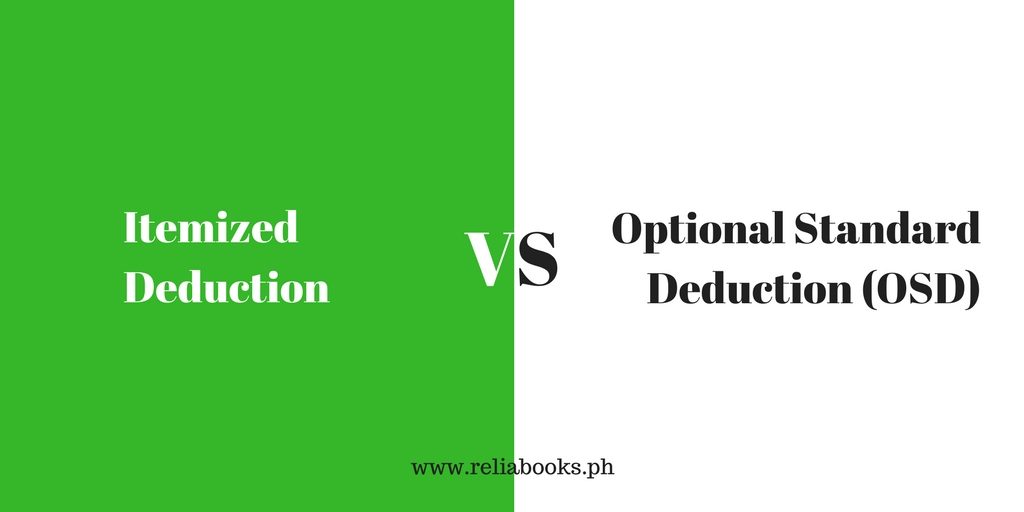
As a business owner, you are required to file your Income Tax Return quarterly and annually.
And when it comes to Income Tax Return, there are two types of tax deduction schemes.
These are Itemized Deduction and Optional Standard Deduction (OSD).
If you want to minimize your tax legally, you must at least understand the basics of these two (2) methods of deduction to your Income.
You will learn the Pros and Cons of each method of deduction below.
1. Itemized Deduction
When you choose Itemized Deduction, your allowable expenses is based on actual expenses supported by receipts.
A. Pros
a. Unlike Optional Standard Deduction (OSD), there is no income tax to be paid when your expenses are higher than your income.
B. Cons
a. It’s time consuming because you need to record all your business expenses in your accounting books called Books of Accounts.
b. In addition to that, your organizing skill is needed because you need to keep receipts of your business expense within 10 years from OR date.
c. You also need to have basic knowledge of what are the allowable deductible expenses in the Philippines.
d. If you decide to outsource your accounting and bookkeeping, retainer fee is a little higher compare to Optional Standard Deduction (OSD)
e. Also, when your gross annual sales, earnings, receipt, or output exceed Three Million Pesos (P3,000,000),
You’re required to hire an independent Certified Public Accountant (CPA) to audit your Books of Accounts, Income Tax Returns, and accounting records.
2. Optional Standard Deduction (OSD)
When you choose Optional Standard Deduction (OSD), your allowable expense is based on forty percent (40%) of:
Gross sales/receipts – for Individual taxpayer and General Professional Partnership (GPP).
Gross Income – for Corporate taxpayers and Co-Partnership. Gross Income is the amount you get after deducting your Cost of Sales or Cost of Service to Gross Sales/receipts.
A. Pros
a. It will save you time because you will not need to record all your expenses in your books of accounts.
b. In addition to that, you are not required to keep receipts of your expenses for income tax purposes.
c. When it comes to your accountant and bookkeeper, retainer fee is lower compare to Itemized Deduction.
d. If you’re an individual taxpayer, you’re not required to hire an independent CPA to audit your accounting records,
When your gross annual sales, earnings, receipt, or output exceed Three Million Pesos (P3,000,000)
e. Your income statement is always positive; this is an advantage if you’re planning to apply for loans.
B. Cons
a. Disadvantage of choosing Optional Standard Deduction (OSD) is that it always shows that you are profitable even if you’re really not.
This means higher income tax for the business owner.
3. Which is Better, Itemized Deduction or Optional Standard Deduction (OSD)?
It depends. You just need to weight the benefits and the cost if each tax deduction scheme stated above.
If you have big operating expenses like salaries, rental, etc, you may consider itemized deduction so that your income tax will be lower.
If you have low operating expenses and most of your expenses are not allowed and not supported by receipts,
Then Optional Standard Deduction (OSD) is a good choice.
You may need to pay higher income tax but you will still save because you will not need to hire a CPA to audit your accounting records.
4. Important Reminder
Keep in mind that whatever method of deduction you choose in your 1st quarterly income tax must be the one that will be applied or consistent throughout the taxable year of choice.
Your decision will become final and irrevocable for the taxable year of choice.
If you want to change the method of deduction on the following year, you need to wait for the 1st quarter of next year.
References
A. Revenue Regulations No. 2-2010
B. Revenue Regulations No. 16-2008
What’s Next?
If you have questions and comments regarding tax, accounting, and business registrations, you can Contact us here.

